LA2050 Blog
We’ve got access to the information that every Angeleno needs to make an impact. Our blog features the latest LA2050 news, announcements, features, happenings, grantee updates, and more.
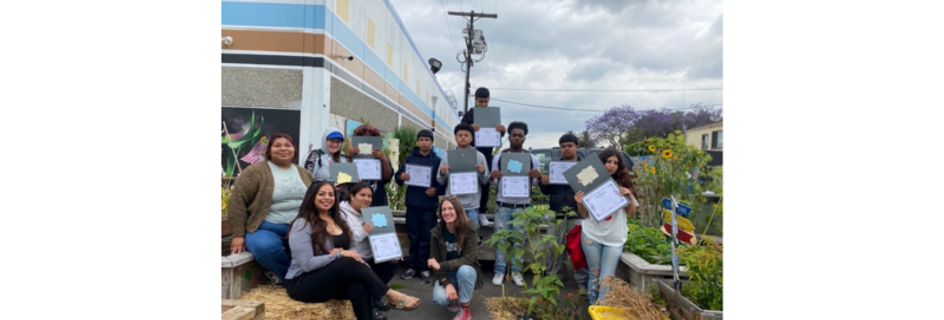
RuckusRoots’ Rebel Garden Project engages 29 systems impacted students
PostedAs we reflect on our LA 2050 Grant-funded project, we are proud of the impacts our team, partners, interns, and community accomplished and are inspired to continue this work! Receiving LA 2050 funding allowed us to transform The Rebel Garden Project from a small pilot program into a larger, much more impactful offering, and catalyzed us to receive other supplemental funds from partners like Sony Pictures Entertainment, Monat Gratitude and The California Arts Council.
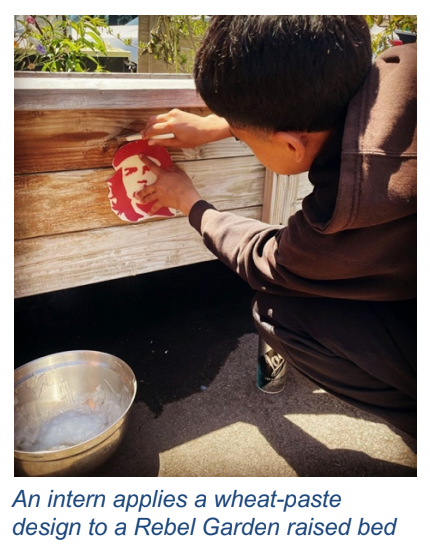
BACKGROUND
In 2021, RuckusRoots began offering The Rebel Garden Project (RGP) as a semester-long internship program to systems-impacted youth in South Los Angeles, in a small raised-bed garden space at Chuco’s Justice Center / Youth Justice Coalition. Our second year of the program, funded in part by LA2050, was a continuation and expansion of RGP, allowing us to build upon learnings and outcomes of the 2021 pilot, and to achieve more community-driven goals for the space.
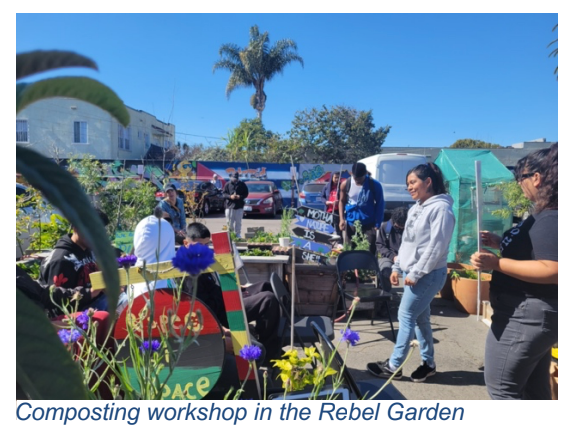
This second iteration of RGP covered 2 semesters and set out to address the root causes of intersectional inequities in the areas of climate resilience, food security and job opportunities (primary Issue Area: BIPOC- and Women-Owned Businesses (CREATE) and secondary Issue Area: Youth Economic Advancement).
IMPACT
We are proud to share that through The Rebel Garden Project, our emerging entrepreneurs received 45 hours of direct, on-site entrepreneurial training in areas that combined urban gardening, business development and creative skills. We achieved our goal of supporting and enlisting South LA-based experts to lead 21 sessions in key program areas such as:
- Resistance and Environmental Racism
- Urban planning & Agriculture
- Indigenous foodways, preparation & consumption
- Composting and Soil Health
- Plant propagation
- Planting in Raised Beds
- Hydroponic Towers: planting, nutrients and harvesting
- Sellable Products to Create from a Garden: Papermaking, Soil Paintings, Native Plant Medicinals and Tinctures
- Exploring Our Food Stories
- Beautifying the Garden: Wheatpasting
- Public Artmaking as Outreach
- Graphic Design: Logos and Branding
- Zine-Making as Marketing for Small Businesses
- Fundraising for Entrepreneurship: How to Get Seed Funding Grants
- Certifying Produce for Sale
- Point of Sale Training
- Food Safety & Handling
- Selling at a Market!
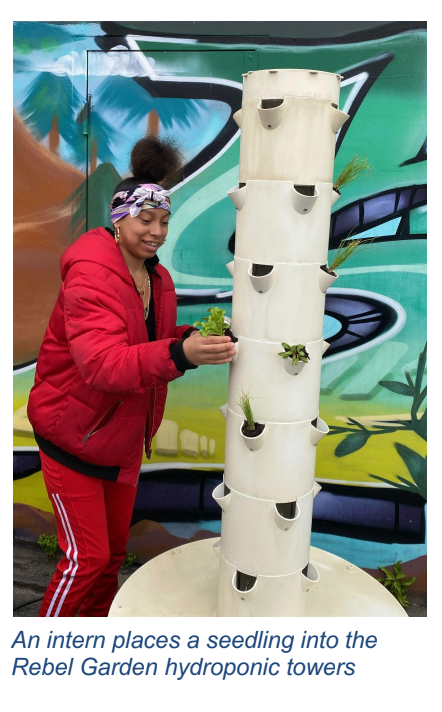
From January-June, 2023, we reached 29 transition-aged, systems-impacted students in once or twice weekly programming. We contracted with 10 local culture bearers and employed 3 South LA residents as coordinators and program assistants. Approximately 350 South L.A community members were indirectly engaged through events held onsite, marketing efforts in-person and online, and at our Market Day at South Central Ave Farmer’s Market.
HIGHLIGHTS
All 29 interns received a certificate and a stipend for participating in RGP. Along with the sessions listed above, many interns also participated in achieving a Certified Growers certificate for the Rebel Garden from the California’s Agricultural Commissioner, as well as planting and harvesting produce and additional garden maintenance days. In our final few sessions, interns designed a logo for The Rebel Garden, which they placed on marketing materials like flyers, stickers, t-shirts and a community run Instagram account. Students also designed a Rebel Garden banner which they used when selling their produce at the Central Ave. Farmer’s Market. This “Market Day” was the culmination of our program followed by graduation the next week. All proceeds from Market Day were split between participating interns on their final graduation stipends.
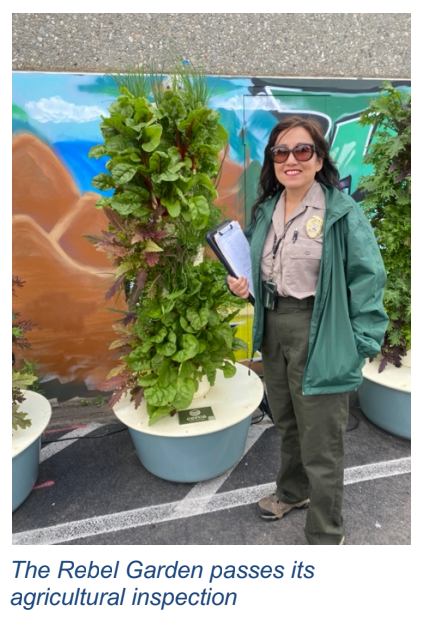
OBJECTIVES and EVALUATIONS
Our funded proposal stated the following objectives:
- The Rebel Garden Project will positively impact interns in:
- Knowledge about soil health
- Ability to identify and care for plants • Confidence in designing a garden
- Ability to work collaboratively in a group
- Confidence in applying for a permit and/or business license • Confidence in designing a logo and branding materials
- Ability to grow and harvest crops and seeds
- Feelings of connection to community and nature
- Confidence in ability to generate and monitor an income stream
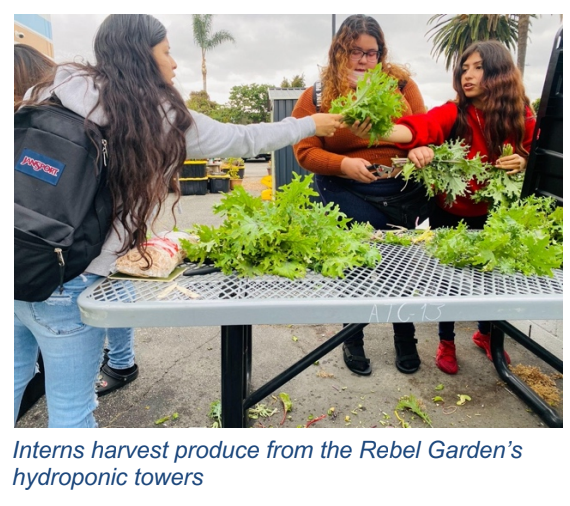
After analyzing the results of intern pre-and post surveys as well as individual interviews, we can report that interns successfully learned to:
1) Build, cultivate and harvest from urban food gardens (both in raised beds and in vertical hydroponic towers)
2) Apply for and gain certified grower status, and sell at a certified farmers’ market
3) Craft a successful brand identity, apply creative business skills to a business idea (ie: interns learned graphic design and used their skills to create a logo, banner and flyers), and promote their project to the local community (interns participated in outreach days, promoting their project at their school, in the community and in their neighborhoods)
4) Manage point-of-sale, price crops for sale, interact with community members as potential customers of the Rebel Garden, and discover options for funding for their business ideas.
Pre- and post surveys also revealed:
- 25% increase in student’s knowledge of how to grow, harvest and cook their own food
- 21% increase in student confidence in sharing opinions about things that matter to them and affect their community
- Overall increase with regards to knowledge of Southern California native plants, brand development and creative confidence
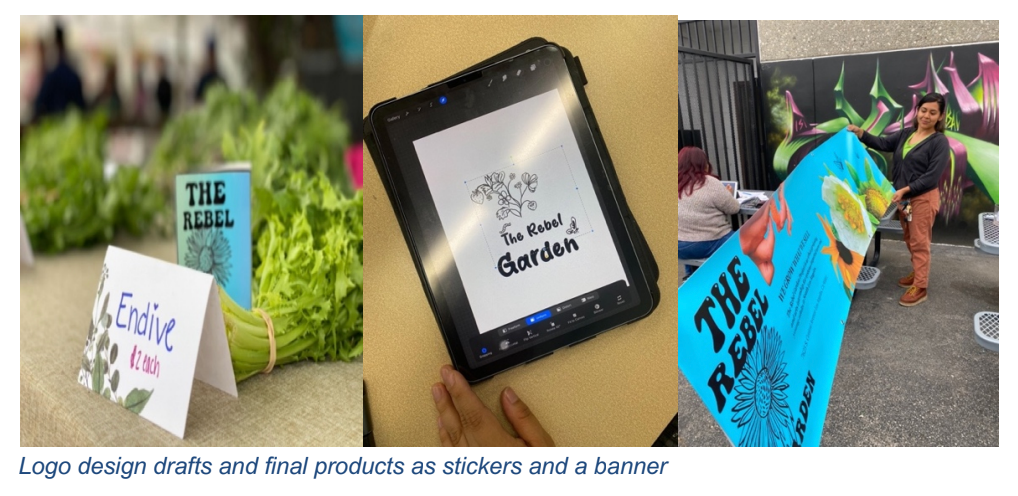
SUCCESS HIGHLIGHTS
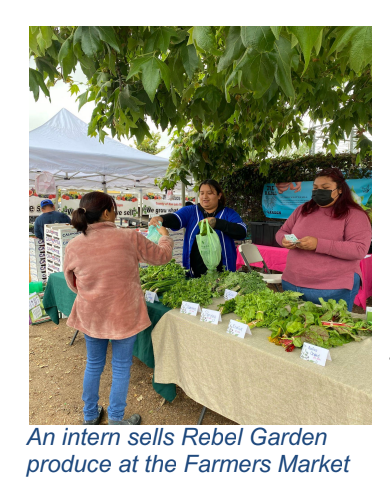
We’re proud to share the following quotes and stories from our team and participants:
“As the coordinator of The Rebel Garden Project, it was amazing to provide a program catered towards youth that focuses not only on gardening, but also integrated arts and business experiences. We were able to also provide everyday life skills, i.e cooking, food safety, farming, managing inventory, and point of sale. It was very heartwarming watching the youth become interested and begin to participate in the weekly workshops, and also encourage their friends from other classes to participate. -Yesenia Morales, Rebel Garden Project Coordinator, South L.A
“Everything about the internship was a really good experience. I learned a lot about gardening that I didn’t know before!” -Margarita, intern
“I never thought I would learn stuff about gardening because I don’t have a garden at home.” -Esmeralda, intern
“It was cool - The thing I liked the most is learning the different types of plants, how to harvest them and how to take care of them. I also learned so much from being at the farmer’s market- it was my first time doing something like that.” -Carla, intern
“I enjoyed the experience of sharing my knowledge. I felt that it was well received and appreciated. I enjoyed seeing how the stewards of the wonderful garden had taken such care. It was an educational experience for me as well.” -RGP Facilitator from FEAST for All
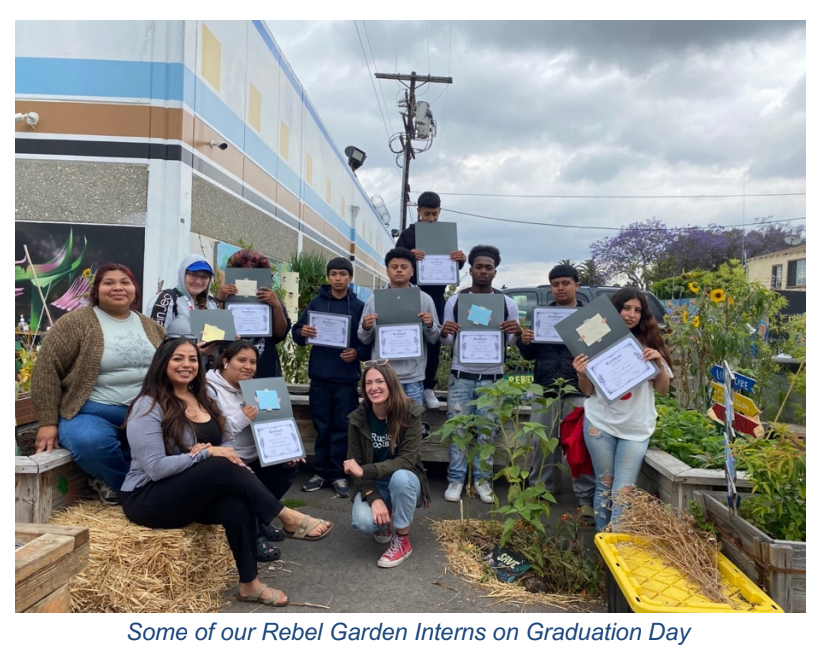
CHALLENGES
Challenges we encountered throughout the program included teacher and school schedule disruptions which led to a dip in program attendance. We solved this by bringing on another teacher and holding one-on-one interviews with students to ensure the program continued to meet their needs.
We also encountered permitting issues with the location site of the Rebel Garden, which hindered our ability to host an on-site farmers market, our original goal. By pivoting to certifying Rebel Garden produce and selling it at a nearby farmers market, we were able to achieve the overall goals of the program to create entrepreneurial pathways and food sovereignty opportunities for youth.
LESSONS LEARNED
Overall, our program was a success. However, we will take the following lessons into future program planning and implementation:
- Hands-on activities for transition-aged youth are best for engagement.
- Building trust with students, host sites and community members takes time, patience, and persistence. Factor this time into budgets and proposals.
- Holding more program days per week and/or having a dedicated on-site staff person as a daily presence would improve communication and attendance, while reducing scheduling conflicts. We look forward to having the capacity to employ someone in this role, with lived experience in the community and in the justice system, in the future.
EXPOSURE & PARTNERSHIPS
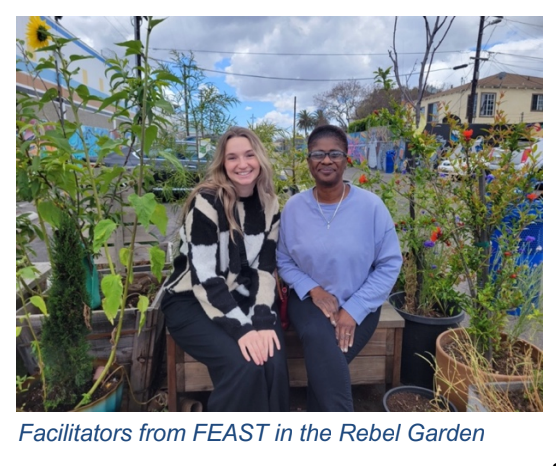
The Rebel Garden Project has allowed us to foster many lasting connections with other organizations, activists and artists in the community, leading to future programs and community collaborations. Some of these include: LA Conservation Corps, FEAST for All Los Angeles, Spirit Plate and South Central Farms. Additionally, the Rebel Garden received a notable mention in an LA Times article featuring trees in Los Angeles, and two members of our onsite RGP team were quoted in the piece. We have also been asked to collaborate with media enterprise Zócalo Public Square, on an essay that features the voice of Rebel Garden co-founder Erica Montelongo. The forthcoming piece (due to be published in early November) is written from her point of view, and focuses on how gardens and green spaces in communities like South LA can help heal the separation from earth, plants and food that systemic colonization has caused. This is one of the primary reasons she started the Rebel Garden and pertains to our goals in working in that space as well, so we’re grateful to be sharing about this project with a broader audience!
LOOKING AHEAD
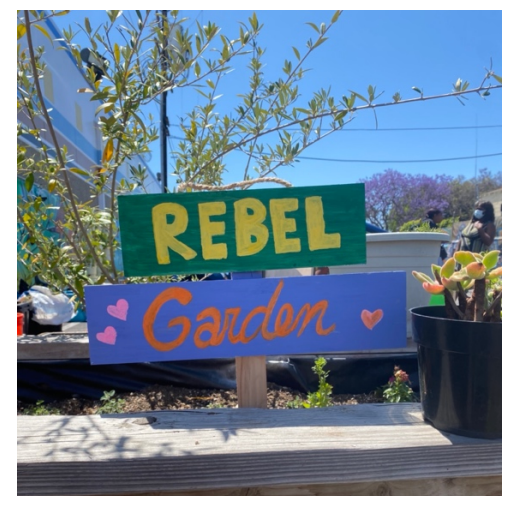
Since June, RuckusRoots has continued our collaboration in the Rebel Garden with local leadership, L.A Compost, and former RGP facilitating staff to host community events, such as a free seed-swapping, microscopy and soil-painting workshop for community members; seeds were harvested directly from the Rebel Garden! Seed packets featured the RGP logo designed by interns, which was a wonderful way to continue to share the work of the students even after the internship concluded formally. Our onsite team also coordinated with a local vendor to print t-shirts with that same student-made logo, and these continue to be sold as a source of income that can help sustain the Rebel Garden’s ongoing maintenance.
We hope to continue building upon our existing relationship with local community leaders at Chuco’s Justice Center / Youth Justice Coalition and in the surrounding area of South Los Angeles through a proposed program expansion called A.L.I.V.E. (Art Living In Vibrant Environments). As a rebranding of already established RGP, this aims to create vibrant, self sustaining spaces in urban Los Angeles communities by uniting plants, art and people.
By offering programming, resources, and tools to meet needs in three key areas — food gardens, native plants and community-led artworks — our goal is for these industrialized, underutilized urban areas to be transformed into beauty-filled, thriving micro-habitats and free food access points for the community. In the 2nd year of this program, if funded, our goal is to activate and engage interested community members in certification of produce grown at A.L.I.V.E sites, for sale at farmers markets, carrying on the learning and impacts of The Rebel Garden Project.
For more, please watch our Rebel Garden Program Video!